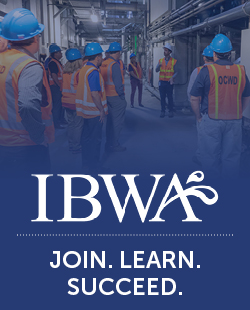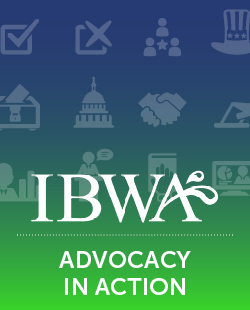COVID-19 Information Resources
COVID-19 Information Resources
Since the beginning of the COVID-19 pandemic, IBWA bottlers, distributors, and suppliers have worked tirelessly to ensure that bottled water, America’s No.1 packaged beverage (by volume), remained available to provide healthy hydration to thirsty consumers. Every step of the way, this association has been there with them, making sure our members have what they need to keep their employees healthy, production lines open, and delivery trucks on the road.
Why do we do it? Because we’ve made a commitment to ensure that bottled water is always there when you need it.
COVID-19: Frequently Asked Questions
COVID-19 presents a very fluid situation—where rules, regulations, and guidelines are often created and revised in the public’s best interest. The sections below offer answers to the question most commonly asked by consumers and industry professionals.
Blank
Your content goes here. Edit or remove this text inline or in the module Content settings. You can also style every aspect of this content in the module Design settings and even apply custom CSS to this text in the module Advanced settings.
Answers for Consumers
LWhat is COVID-19?
COVID-19 is a disease caused by the virus 2019-nCoV, more commonly known as Novel Coronavirus. Novel Coronavirus is known as one among a large family of coronaviruses that cause illness ranging from the common cold to more severe diseases such as Middle East Respiratory Syndrome (MERS) and Severe Acute Respiratory Syndrome (SARS), according to the World Health Organization (WHO).
COVID-19 has affected millions of people across the globe and has been described as a new strain of coronavirus that was discovered in 2019 and has not been previously identified in humans. Common signs of COVID-19 infection include fever, cough, shortness of breath, and breathing difficulties. People can catch COVID-19 from others who have the virus. The disease can spread from person to person through small respiratory droplets, which are spread when a person with COVID-19 coughs or exhales. To help prevent the spread of COVID-19, the U.S. Centers for Disease Control and Prevention (CDC) recommends the following: stay at least 6 feet away from others, cover your mouth and nose with a mask, wash your hands regularly, avoid crowded indoor spaces or ensure those spaces are properly ventilated, isolate when sick, and routinely disinfect high-touch surfaces.
Has COVID-19 been detected in drinking water? No.
The CDC’s Water Transmission and COVID-19 webpage addressed COVID-19 transmission through drinking water, stating the following: “The virus that causes COVID-19 has not been detected in treated drinking water. Water treatment plants use filters and disinfectants to remove or kill germs, like the virus that causes COVID-19. . . Currently, there is no evidence that the virus that causes COVID-19 can be spread to people by drinking treated water. According to Drinking Water Research Foundation (DWRF) Trustee Dr. Eugene Rice, “Bottled water produced using multiple barrier treatments—such as filtration, disinfection, and reverse osmosis—during processing should also remove or inactivate the virus that causes COVID-19.”
Can COVID-19 be transmitted via food or food packaging? No.
After more than a year since the coronavirus disease 2019 (COVID-19) outbreak was declared a global health emergency, the U.S. Department of Agriculture, the U.S. Food and Drug Administration, and the U.S. Centers for Disease Control and Prevention continue to underscore that there is no credible evidence of food or food packaging associated with, or as a likely source of, viral transmission of severe acute respiratory syndrome coronavirus 2 (SARS-CoV-2), the virus causing COVID-19. Learn more
Are recalls on food anticipated? No.
FDA does not anticipate that food products would need to be recalled or be withdrawn from the market because of COVID-19. FDA reaches that conclusion because “there is currently no evidence to support the transmission of COVID-19 associated with food or food packaging.” In addition, bottling facilities are required to control any risks that might be associated with workers who are ill regardless of the type of virus or bacteria. For example, facilities are required to maintain clean and sanitized facilities and food contact surfaces.
Answers for Bottled Water Industry Professionals
Vaccine FAQs
Can bottled water employees get the vaccine?
The bottled water industry, along with the food, beverage, and agriculture sectors, was defined early in the pandemic by the U.S. Department of Homeland Security as critical to infrastructure, and individuals working in the industry are “essential employees.”
The U.S. Centers for Disease Control and Prevention (CDC) guidance suggests that states offer COVID-19 vaccinations to individuals working in the food and agricultural sector starting in Phase 1b distribution. This phase follows Phase 1a, which focuses on distributing vaccines to those in long-term care facilities and healthcare professionals. Specifically, the CDC guidance includes food, agriculture, and manufacturing frontline essential workers as part of Phase 1b allocation, along with first responders, educators, and others deemed essential. As states follow the CDC guidance or create distribution plans based on that guidance, it may be important for those in the bottled water industry to have documentation to prove that industry employees are critical to infrastructure and should receive vaccines during Phase 1b allocation.
IBWA has created a one-page document that members of the bottled water industry can provide to employees seeking COVID-19 vaccinations during Phase 1b distribution. The document can be edited to include specific state information relating to how the CDC guidance coincides with specific state guidance on vaccine distribution. CLICK HERE to download IBWA’s “Certification of Essential Worker Status for COVID-19 Vaccination” document.
How are the various states handling vaccine distribution?
States across the country have submitted COVID-19 vaccination plans to be reviewed by the CDC. Plans are based upon the COVID-19 Vaccination Program Interim Playbook for Jurisdiction Operations as developed by the CDC.
- States were asked to consider many different items including:
- Public health preparedness planning
- Phased approaches to vaccination
- Identification of critical populations
- Provider recruitment and enrollment
- Capacity to administer
- Vaccine storage and handling
Visit the Council of State Government “COVID-19 Resources for State Leaders” webpage for detailed information on each state’s vaccination plan.
What should I consider before implementing vaccination policies?
Employers have critical decisions to make about their vaccination policies. Below are questions that should be considered before implementing vaccination policies within your company:
- What are the liabilities and risks associated with requiring/not requiring employees to be vaccinated?
Should employees be monitored for vaccinations/immunity? If so, how can that be conducted without violating privacy regulations? - Will the company offer the COVID-19 vaccine? If so, how will compliance with local health regulations and other employment policies be achieved?
- What are the cost implications? Will governments, other organizations, insurers, or employees assume or share the costs?
- How will public health disparities across geographically dispersed workplaces be monitored and handled?
Vaccine Resources
Developing a Vaccine Strategy
Whether Employers Require or Encourage Employees to Get the COVID-19 Vaccine, They Need a Plan (Society of Human Resource Management)
Elements of Workplace COVID-19 Vaccine Strategy (National Safety Council)
Communicating Effectively About Vaccines
COVID-19 Vaccine Communication Guide (National Institutes of Health)
How A Communicator’s Guide To COVID-19 Vaccination (Institute for Public Relations)
Language that Works to Improve Vaccine Acceptance (de Beaumont Institute)
COVID-19 Vaccination Communication Toolkit 9CDC)
Message Testing: How Employers Should Talk About the COVID-19 Vaccine (Civis Analytics)
Legal Analysis on Vaccinations
Vaccine Considerations for Employers (U.S. Chamber)
Vaccine Playbook for Employers (Gibson Dunn)
Survey: Employer Approaches to Vaccine Mandates PDF (Littler)
Global Legal Issues: International Employment Landscape (Seyfarth)
General COVID-19 FAQs for Employers
What actions can I take to help prevent the transmission of COVID-19?
There are myriad recommendations provided by the CDC to prevent the spread of COVID-19 in your business. These include recommendations to prevent the spread among employees and maintain healthy business operations and work environments. For more information, please visit the CDC webpage detailing guidance for businesses and employers responding to the Coronavirus disease.
What steps should an employer take when an employee tests positive for COVID-19?
FDA advises that if an employee in a food processing facility tests positive for COVID-19, facilities should take the following steps to ensure the foods they produce are safe:
- Inform fellow employees of the possible exposure to COVID-19 in the workplace, while maintaining
confidentiality. - Instruct sick employees to follow the CDC’s “What to do if you are sick with coronavirus disease 2019 (COVID-19) guidance.”
- Wait 24 hours before cleaning and disinfecting to minimize potential for other employees being exposed to
respiratory droplets. If waiting 24 hours is not feasible, wait as long as possible. - During this waiting period, open outside doors and windows to increase air circulation in these areas.
- Follow the CDC cleaning and disinfection recommendations.
- Determine which employees may have been exposed to the virus and may need to take additional precautions.
The FDA guidance also addresses whether a food facility must close after an employee has tested positive for COVID-19, advising that “food facilities need to follow protocols set by local and state health departments, which may vary depending on the amount of community spread of COVID-19 in a given area.” FDA says that these decisions will be based on public health risk of person-to-person transmission—not based on food safety. FDA reaches this conclusion because “there is currently no evidence to support the transmission of COVID-19 associated with food or food packaging.”
What does FDA recommend for service industry workers who deal with the public?
FDA recommends the following actions for service industry workers who deal with the general public:
- Wear a face mask covering the mouth and nose.
- Avoid close contact with people who are sick.
- Avoid touching your eyes, nose, and mouth.
- Stay home when you are sick.
- Cover your cough or sneeze with a tissue, then throw the tissue in the trash.
- Wash your hands often with soap and water for at least 20 seconds, especially after going to the bathroom;
before eating; and after blowing your nose, coughing, or sneezing. If soap and water are not readily available, use an alcohol-based hand sanitizer with at least 60 percent alcohol. Always wash hands with soap and water if hands are visibly dirty.
Helpful Resources
Coronavirus (COVID-19)
Coronavirus Disease 2019 (COVID-19) Frequently Asked Questions
Guidance for Businesses and Employers to Plan and Respond to Coronavirus Disease 2019 (COVID-19)
Coronavirus Disease 2019 (COVID-19): Cleaning and Disinfecting your Facility
Coronavirus Disease 2019 Information for Travel
Source: U.S. Food and Drug Administration (FDA)
Coronavirus Disease 2019 (COVID-19)
Coronavirus Disease 2019 (COVID-19) Frequently Asked Questions
Food Safety and the Coronavirus Disease 2019 (COVID-19)
Guidance for Industry: Temporary Policy Regarding Preventive Controls and FSVP Food Supplier Verification Onsite Audit Requirements During the COVID-19 Public Health Emergency
Source: U.S. Environmental Protection Agency (EPA)
Disinfectants for Use Against COVID-19 (List N: Disinfectants for Use Against SARS-CoV-2)
Source: Occupational Safety and Health Administration (OSHA)
Protecting Workers: Guidance on Mitigating and Preventing the Spread of COVID-19 in the Workplace
Source: U.S. Department of Labor (DOL)
COVID-19 or Other Public Health Emergencies and the Fair Labor Standards Act Questions and Answers
Source: World Health Organization (WHO)
Situation Reports
Q&A on coronaviruses (COVID-19)
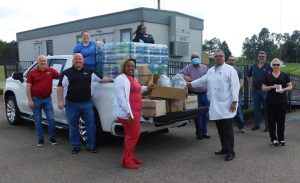 A Niagara Bottling plant team proudly makes a donation of protective equipment and bottled water to representatives from Alliance HealthCare System in Byhalia, Mississippi, in support of their efforts to combat the COVID-19 pandemic.
A Niagara Bottling plant team proudly makes a donation of protective equipment and bottled water to representatives from Alliance HealthCare System in Byhalia, Mississippi, in support of their efforts to combat the COVID-19 pandemic.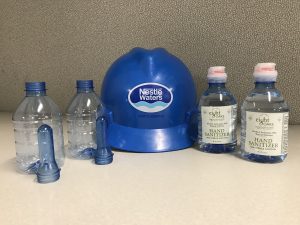 Nestlé Waters is working with local distilleries to provide them with bottles to be filled with hand sanitizer for healthcare workers, first responders, and the public.
Nestlé Waters is working with local distilleries to provide them with bottles to be filled with hand sanitizer for healthcare workers, first responders, and the public.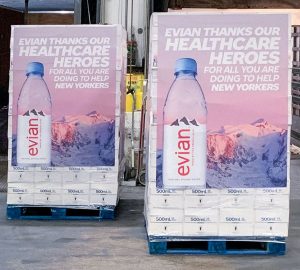 Danone Waters of America has provided support to New York City frontline workers with a donation of almost 500,000 bottles of water to local hospitals.
Danone Waters of America has provided support to New York City frontline workers with a donation of almost 500,000 bottles of water to local hospitals.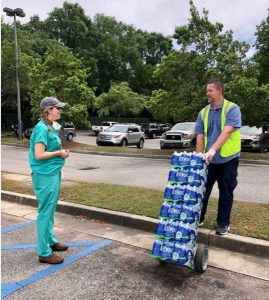 In Mobile, Alabama, a nurse working at an infirmary COVID-19 testing site is happy to receive bottled water donated from
In Mobile, Alabama, a nurse working at an infirmary COVID-19 testing site is happy to receive bottled water donated from  IBWA bottler member Aqua Filter Fresh donated cases of bottled water to an April 4 community “Social Distancing Pizza Party,” held by the Allegheny County Police Department.
IBWA bottler member Aqua Filter Fresh donated cases of bottled water to an April 4 community “Social Distancing Pizza Party,” held by the Allegheny County Police Department.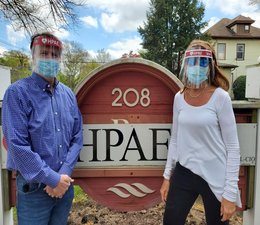 Polymer Solutions International donated 4,200 face shields to the Health Professionals and Allied Employees, the largest union of registered nurses and healthcare professionals in New Jersey.
Polymer Solutions International donated 4,200 face shields to the Health Professionals and Allied Employees, the largest union of registered nurses and healthcare professionals in New Jersey.
